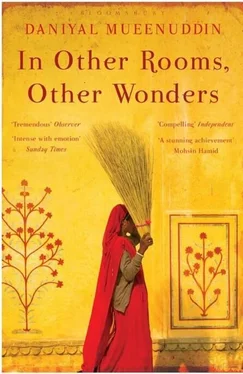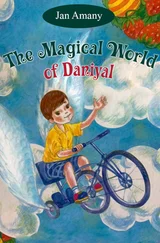Goodbye to the life she would never have, a life she despised, economies that she would never make as she cooked and kept house for a clerking husband in the Old City, one of the boys who might have accepted her hand. They might have gone away, might have moved out to the new suburbs of Lahore — the ones out by the airport, grids of streets laid out in wheat fields or untended orchards, no houses yet built. The moment with K. K. meant a great deal to her, but not in the way that he understood it — without meaning to, she had given herself completely. She could pretend later to be a virgin; or someone would take her even knowing she wasn’t. A marriage could always be arranged, it was always a bargain, a deal. But she knew then that she wouldn’t have another man, because anyone after this would have to be a compromise, a salary man.
When he had no guests, K. K. ate lunch with Husna. Rafik served with care, offering the dishes from the left, removing plates from the right, the napkins starched and arranged like fans by the plates. In May now the air-conditioning had been turned on. In this room, the coolest in the house, Husna felt the most intimidated. She sat at his right, at the far end of the long table that could seat eighteen, and spoke little. Over the past month she had learned which utensils to use, but still did not use them gracefully. K. K. chewed his food exactly ten times before swallowing.
One afternoon, as Rafik brought in a cheese soufflé, a car drove up to the house. K. K. had his back to the window and did not turn. They heard the creaking of the carved swinging doors, taken from K. K.’s ancestral home in the Old City, and then the visitor, a middle-aged woman, pushed into the dining room.
‘Hello, Daddy,’ she said. ‘Isn’t this cozy!’ She had a tinkling laugh which, while it did not seem entirely genuine, by its musicality caused the hearer to join her in a height ened response, like a painting that one knows to be good, although one is unmoved by it.
K. K. rose, seeming suddenly frail and old, and kissed his youngest daughter on the forehead.
‘Hello, darling. When did you get in?’
‘Just now, on the eleven o’clock flight. I’m here because Pinky’s daughter got secretly engaged. Don’t ask!’
They sat down, including Husna, who had also risen.
‘This is Husna,’ said K. K., ‘Mian Nasiruddin’s daughter.’
‘Yes, yes, I know,’ said Sarwat maliciously, looking not at Husna’s face but at her person. ‘I met her at Mummy’s.’
Rafik brought in a mat and laid a place for Sarwat. ‘Good Lord, Rafik,’ she commented, rearranging the cutlery, ‘you’re getting even fatter.’
Sarwat settled back into her chair. She wore an understated tan sari, a gold watch, several unusual rings — a star sapphire and a Burmese pigeon-blood ruby. Her salt-and-pepper hair, worn in a high chignon, lengthened her still beautiful face; and her slender manicured body suggested lotions and expensive soaps, a hairdresser and a masseuse, idleness and ease. In all she looked rich and sleek and voluptuous. Even at fifty she had admirers, and it had become a convention among the circle in which she moved to speak of her lovely gray eyes.
‘I am very glad to meet you,’ said Husna. ‘I have heard so much about you.’
Sarwat looked down at the girl with a wolfish grin, almost spoke, then turned to her father. ‘You look well, Daddy.’
He had resumed eating, and with his mouth full, raised a fork, as if to say, You can see for yourself.
‘Tell me, what do you know about the Talpur boy, the son of Bilqis Talpur? Mumtaz went off and got engaged to him, and Pinky’s absolutely livid. That’s why she called me here. I can only stay for a minute, I told her I’d be at her house just after lunch.’
K. K., who took these matters seriously, put down his fork. ‘I spent time with his grandfather when I was posted to Leiah. The old man had a bit of a temper, and of course you know about the father. You should speak to Wali, the boy was at Aitchison with him, a year before or a year after.’
Husna broke in. ‘He is very handsome.’
Sarwat looked at her in amazement, as if the furniture had spoken. ‘Tell me about the land,’ she said to her father.
‘It’s good land, on the river. The family used to hold a big parcel near the city, and that would be enormously valuable.’ He looked at her, raising a warning eyebrow. ‘But then they say that Jano spent the last thirty years drinking it away.’
Finishing the meal, they rose to have green tea in the living room.
As they stood, Sarwat said to Husna, ‘I’d like to be alone with my father, please.’
K. K. followed Sarwat into the living room. She sat down on a sofa and tucked her feet under herself, leaning against a large pillow. ‘Really, Daddy,’ she began. ‘I can imagine keeping her around, but to sit and have lunch with her, that’s too much. You’re becoming eccentric, you really are.’
‘She comes from a good family,’ said K. K. ‘Her great-grandfather owned more land than yours. But for a few twists of fate she might be in your place, and we might be living still in the Old City.’
‘But we’re not,’ said Sarwat. ‘That’s the point, we’re not.’ She tried another tack. ‘And what can you possibly find to say to her? Sheherezad told me she came for tea the other day, and that this unfortunate little thing sat without saying a word, just listening, like a frog in the corner. It’s indecent.’
‘She, too, would have wished for your advantages, my dear, your schools and clothes and friends and property.’
‘Please, Daddy. I doubt if this is a humanitarian mission.’
‘And I’m lonely, Sarwat. You’re in Karachi, Kamila is in New York, and Rehana has barely spoken to me in ten years. My friends are dying off or don’t go out anymore. She keeps me company. She’s no genius, if you like, but she can play cards and so on. Why don’t you spend more time in Lahore? You have a lovely house here, friends here. I would much prefer to see you than her, but you’re not available.’
‘What about Riffat or one of your other old girlfriends? Why choose someone like this, she’s neither pretty nor presentable.’
‘At my age, what I need is companionship, and Husna can give that to me. Riffat can only come for tea or for a few hours, but Husna is here whenever I need her.’
They sat in silence, neither satisfied with the other. After a few moments, Sarwat put down her cup. ‘Daddy, I must go. I’ll come this evening. Please, at least tell her not to come out when I’m here.’
That afternoon when Husna entered his room, summoned from the annex, K. K. felt abashed. Irresistibly drawn to the one subject that he wished to avoid, he said, ‘It’s wonderful to see Sarwat. I hope you and she will get to know each other.’ He had been sitting on the edge of the bed, and now he rolled over, tucked himself under the sheet, and put a black mask over his eyes, to screen out the light.
Snarling, her face contorted, Husna exploded. ‘She’s mean and rude. She treated me like dirt. Why don’t you get her to come live in the annex and play cards with you and make your tea?’
‘I can’t have you speak like this,’ said K. K., removing the mask, his face drawn and imposing. ‘You’re upsetting me.’ He spoke in a measured voice. ‘You’ve upset me.’
‘I’m leaving this house,’ she said, standing up on the bed, looking down at him. ‘I gave you everything I had, but you give me nothing in return. I have feelings too, I’m human. She made me feel like dirt, and you didn’t say anything to stop her.’ She began to cry hysterically, and when he sat up and tried to touch her leg she shrieked and stepped back. ‘Even the servants here treat me as if I’m nothing. When I ask for things they tell me that they don’t have time. I have to crawl even in front of them. Yesterday Hassan swore at me.’
Читать дальше












